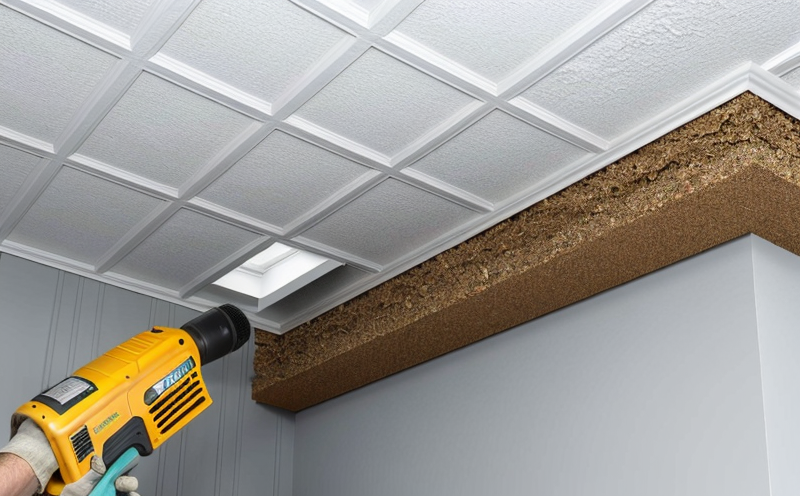Testing how thermal insulation interacts with other materials in construction, such as drywall or siding
The Crucial Role of Thermal Insulation Interaction Testing in Construction Why Businesses Need Eurolabs Expertise
As the construction industry continues to evolve and demand for energy-efficient buildings grows, thermal insulation has become an essential component in modern building design. However, when it comes to ensuring that a structure is properly insulated, one crucial aspect often goes overlooked how different materials interact with each other during the construction process.
Thermal insulation interaction testing, also known as material compatibility testing, assesses how various materials used in construction, such as drywall or siding, affect the performance of thermal insulation. This critical laboratory service, provided by Eurolab, plays a vital role in preventing costly mistakes and ensuring that buildings meet stringent energy efficiency standards.
In this comprehensive guide, well delve into the importance of testing thermal insulation interaction with other materials in construction and explore the benefits of partnering with Eurolab for this essential service.
The Importance of Thermal Insulation Interaction Testing
Thermal insulation is a crucial component in maintaining a buildings energy efficiency. However, when different materials are used together, their individual properties can interact in unforeseen ways, compromising the overall performance of the thermal insulation system. This can lead to reduced energy savings, increased risk of mold and moisture damage, and even safety hazards.
To mitigate these risks, construction professionals must be able to predict how various materials will interact with each other during the building process. Eurolabs thermal insulation interaction testing service offers a solution by providing a laboratory assessment of material compatibility under controlled conditions.
The Benefits of Thermal Insulation Interaction Testing
Partnering with Eurolab for thermal insulation interaction testing provides numerous benefits, including
Reduced Risk of Energy Efficiency Failures By understanding how materials interact with each other, construction professionals can minimize the risk of energy efficiency failures and ensure that buildings meet or exceed industry standards.
Increased Material Compatibility Thermal insulation interaction testing helps identify potential material incompatibilities, enabling manufacturers to reformulate products or adjust installation procedures to optimize performance.
Improved Building Design and Construction Efficiency With a deeper understanding of material interactions, architects and engineers can design more efficient building systems, reducing construction costs and timelines.
Enhanced Energy Savings By optimizing thermal insulation performance, buildings can achieve significant energy savings, reducing operating costs and environmental impact.
How Eurolabs Thermal Insulation Interaction Testing Works
Eurolabs laboratory service involves a comprehensive evaluation of material compatibility using advanced testing methods. The following steps outline the process
Material Collection Eurolab receives samples of the materials to be tested, including thermal insulation, drywall, siding, and other relevant components.
Testing Preparation Samples are prepared for testing according to established protocols, ensuring accurate and reliable results.
Thermal Insulation Interaction Testing Advanced equipment is used to assess material interactions under controlled conditions, simulating real-world scenarios.
Data Analysis and Reporting Eurolabs expert team analyzes test data and provides a comprehensive report detailing material compatibility, recommendations for improvement, and potential areas of concern.
Common Applications for Thermal Insulation Interaction Testing
Eurolabs thermal insulation interaction testing service is applicable to various construction projects, including
Residential and commercial building design
Retrofitting existing buildings for energy efficiency upgrades
Developing new materials or products with improved thermal performance
Ensuring compliance with industry standards and regulations
Frequently Asked Questions (FAQs)
Q What types of materials can be tested for thermal insulation interaction?
A Eurolabs laboratory service assesses a wide range of materials, including but not limited to, drywall, siding, wood, and various types of thermal insulation.
Q Why is thermal insulation interaction testing essential in construction?
A By understanding how different materials interact with each other, construction professionals can prevent costly mistakes, ensure energy efficiency compliance, and reduce the risk of material failures.
Q Can Eurolab provide custom testing services for unique or proprietary materials?
A Yes, Eurolabs team is experienced in adapting testing protocols to accommodate specific material requirements. Please contact us to discuss your project needs.
Q What are the benefits of partnering with Eurolab for thermal insulation interaction testing?
A By working with Eurolab, construction professionals can benefit from reduced risk, increased material compatibility, improved building design and construction efficiency, and enhanced energy savings.
Conclusion
Thermal insulation interaction testing is a critical component in ensuring that buildings meet stringent energy efficiency standards. Eurolabs laboratory service provides a comprehensive evaluation of material compatibility under controlled conditions, offering numerous benefits for businesses and construction professionals.
Dont risk costly mistakes or compromised building performance due to inadequate thermal insulation interaction testing. Partner with Eurolab today to ensure your projects meet industry standards and achieve maximum energy savings.




